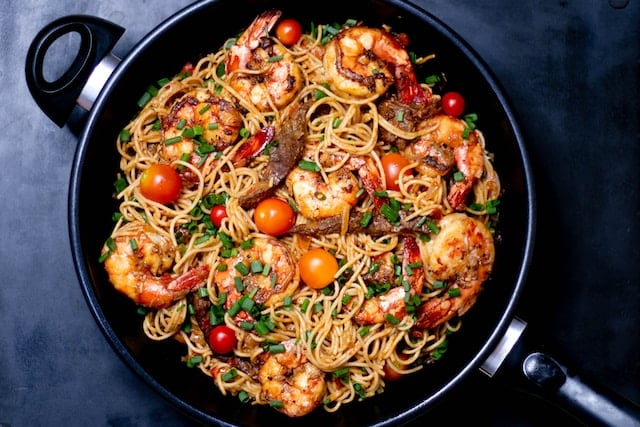What’s the Key to a Juicy, Herb-Crusted Rack of Venison with a Red Wine Jus?

Cooking a juicy, herb-crusted rack of venison with a red wine jus can be a daunting experience for even the most seasoned chefs. The process involves selecting the right cut of venison, properly seasoning it, searing it to a perfect crust, and finally serving it with a rich, flavorful sauce. However, with the right techniques and tips, you can prepare this gourmet dish in the comfort of your home kitchen.
Choosing the Right Cut of Venison
Venison, or deer meat, is a lean type of wild game meat that is rich in flavor and nutrients. The first step in your cooking journey is selecting the right cut. The rack, which is equivalent to a pork or beef rib roast, is an excellent choice for this recipe.
Sujet a lire : What Are the Steps to Crafting a Luxurious Gold Leaf-Topped Chocolate Truffle Cake?
When you choose your cut of venison, look for a deep red color with no signs of graying. The meat should be firm to the touch, and the layer of fat on top should be white or cream-colored. As with any type of meat, fresher is always better. A key tip when purchasing venison is to find a reputable butcher who specializes in game meat.
Seasoning your Venison
After you have selected the perfect cut of venison, it’s time to season it. The herbs and spices you use can greatly enhance the natural flavor of the deer meat. For this recipe, you’ll need a mix of classic herbs such as rosemary, thyme, and garlic.
Lire également : Can You Prepare a Gourmet White Asparagus and Hollandaise Tower with a Twist?
First, pat your rack of venison dry with a paper towel. This will remove any excess moisture, allowing the meat to brown more evenly in the pan. Next, rub the venison with a generous pinch of salt. This will not only season the meat but also help to draw out the natural juices, resulting in a tender and flavorful steak. After salting, you can proceed to coat the venison with your mixture of herbs.
Searing to Perfection
Now, it’s time for the crucial part – searing the venison. Heat a heavy-bottomed pan over high heat until it is smoking hot. Add a dash of oil, and then place your rack of venison in the pan. The aim is to get a nice, brown crust on the meat which will enhance the flavor.
Turn the venison every couple of minutes to ensure even browning. Remember, searing is not about cooking the meat through, but about creating a flavorful crust. After searing, you can continue to cook the venison in the oven for around 15-20 minutes, or until it reaches your preferred level of doneness.
Preparing the Red Wine Jus
While your venison is roasting in the oven, you can start working on the red wine jus. This sauce is a classic accompaniment to venison, adding a touch of richness and elegance to the dish. Start by sautéing finely chopped onions and garlic in a pan until they are translucent.
Next, pour in a good quality red wine. Allow the wine to simmer and reduce to about half its original volume. This concentrates the flavors and removes the alcohol. Then, add in your beef or venison stock, and let the sauce simmer until it becomes syrupy.
Serving your Venison
Finally, it’s time to serve your masterpiece. Allow the venison to rest for a few minutes before carving. This allows the juices to redistribute throughout the meat, ensuring a juicy steak. Spoon some red wine jus over the venison, and serve with your favorite sides.
In conclusion, the key to a juicy, herb-crusted rack of venison with a red wine jus lies in the quality of your ingredients, the careful preparation of your venison, and the love and attention you give to each step of the cooking process. With these tips and techniques, you are sure to impress your guests with a gourmet venison dish that is full of flavor and elegantly presented.
Cooking Venison Backstrap with Olive Oil and Sous Vide
After perfecting your seasoning and searing, you might want to try an alternative method to oven roasting – cooking venison backstrap with olive oil and sous vide. Sous vide, a French term for "under vacuum", involves cooking food in a sealed bag in a water bath at a precise temperature. This technique ensures that the meat is cooked evenly, retaining its juices and achieving the perfect level of doneness.
Firstly, season your venison backstrap as instructed in the seasoning section. Then, place it in a vacuum-sealed bag with a couple of tablespoons of olive oil. The oil helps to transfer heat from the water to the meat, ensuring that it cooks evenly.
Next, you’ll need to prepare your sous vide. Set your sous vide machine to your preferred temperature. For venison, this is typically between 130 to 140 degrees Fahrenheit (54.4 to 60 degrees Celsius) for medium-rare to medium doneness. Submerge your bag of venison in the water bath and let it cook for anywhere from 1 to 4 hours.
After the sous vide cooking process is complete, it’s important to give your venison backstrap a quick sear on a cast iron skillet over high heat. This will give your steak a flavorful crust and keep the inside nice and tender.
Utilizing Leftovers for Pulled Pork and Ground Venison
If you’re lucky enough to have any leftovers from your juicy, herb-crusted rack of venison, you can repurpose them into delicious pulled pork or ground venison recipes.
For pulled pork, shred the remaining venison with a fork. Heat a skillet with a dash of oil over high heat, add the shredded meat, and toss it with your favorite barbecue sauce. Serve this pulled pork style venison on a bun with a side of coleslaw for a satisfying next-day meal.
On the other hand, if you have access to a meat grinder, you can grind your leftover venison to make ground venison. This can be used in a variety of dishes including chili, burgers, and pasta sauces. Ground venison is a great lean, flavorful alternative to traditional ground beef.
Conclusion: Mastering Venison Cooking Techniques
In conclusion, venturing into the world of venison cooking can be a challenging yet rewarding experience. From selecting a quality cut of deer meat, perfecting the seasoning, mastering the searing process on a cast iron skillet over high heat, exploring alternative cooking methods like sous vide, to utilizing leftovers for pulled pork or ground venison, each step is crucial to achieving that succulent, flavorful venison meal.
Whether it’s a simple venison steak or a sophisticated rack of venison with a red wine jus, remember that patience, attention to detail, and a passion for cooking are key. With time and practice, you’ll be able to serve up a juicy, herb-crusted venison that will impress your family and friends. After all, the joy of cooking lies not only in the delicious end result but also in the process of creating a dish from scratch. So why not give venison a try in your next home-cooked meal?
